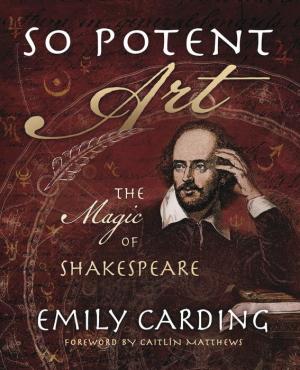Shakespeare's plays and poems are infused with magic, and from the first page to the last, Ms. Carding shows us how profoundly magic influenced The Bard's writings. Written in an academic, but engaging manner, the author explains how magic was still highly regarded in Elizabethan society, and because of that, hermeticism, astrology and alchemy appear prominently in Shakespeare's works.
The supernatural features heavily in most of the plays. Ghosts are predominately messengers from the beyond, and often portend disaster. Witches are also found, as most are familiar with Macbeth and also portend of doom, as are soothsayers, such as the one found in Julius Caesar, who was literally given the date of his assassination, and yet, chose to ignore it. Ignoring the supernatural, Shakespeare suggests, is putting one's self in peril. Dreams are used as a device for expressing a guilty conscience. In the movie Macbeth, Dame Judy Dench, as Lady Macbeth is seen sleepwalking. Later, during her monologue, “out, out, damned spot,” Dench utters a hair-raising scream while trying to wipe nonexistent blood off of her hands.
A chapter to herbalism is devoted to the plants mentioned in the plays. The herbs, trees and other plants seem to have been extracted from old grimoires, but could also have been folk wisdom at the time. Violets, for example, are mentioned by Ophelia in the play Hamlet, where she talks about love and grief after her father was murdered by Hamlet himself. Violets, we find, are ruled by the planets Venus and Jupiter; both of which are symbolic of hope and love. This could have dual meaning, because when the violets died, not only did her father die, but her love for Hamlet died as well.
Carding makes it easy to fall in love with The Bard again. The plays themselves are inspiration for creating our own magic. Each chapter ends with exercises the seeker can do to enhance their own magical workings. There are invocations, prayers, and ritual theater that we can use as inspiration to create our own magic.
One of the things that I found most fascinating about the book is the idea that the Globe Theater wasn't just a place to go see plays, but was more of a hermetic-style temple where shamanic-type events occurred. As an example, Richard Olivier, director and creator of mytho-drama, had an African shaman come to the theater and “taught the cast of Henry V a war rhythm on the djembe, and this drumbeat was used before performance to help create an authentic atmosphere of war.” This also created a type of immersive theater, in which the audience becomes deeply involved in the magical aspects of the play.
I absolutely love Shakespeare and I loved Carding's work as well. I wish that it had been on my bookshelf when I was in University, oh the papers I would have written! My only concern is that people who had middle and high school teachers flog their students with Shakespeare's plays and poems in a ham-handed manner could be put off by the content. Don't be. It's time to unlearn all of that, and engage in the beautifully written language and magic that The Bard offers. Then attend a play, outdoors, if possible.
The play, after all, is the thing.
~review by Patricia Snodgrass
Author: Emily Carding
Llewellyn Publications, 2021
p. $24.99 pp.348
So Potent Art: The Magic of Shakespeare

©
2010 - 2025
Facing North
